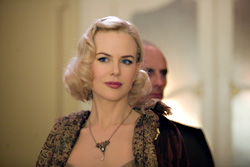No fan of the “tweedy medievalist” C.S. Lewis, avowed atheist and novelist Philip Pullman set out to dissemble much of Narnia‘s embedded dogma with this story of a girl’s quest to free children from their zombielike servitude to quasi-Christian, sin-obsessed authority. Chris Weitz opens his film adaptation by introducing us to the “other world,” where humans walk alongside their own souls. Soon we meet Lyra (Dakota Blue Richards), who, in her attempt to help her uncle research the source of Dust (Dust being a euphemism for “all the death, the sin, the misery, the destructiveness in the world”), gets kidnapped by Nicole Kidman, escapes, and then journeys to rescue a pal in peril. Along the way, Lyra masters reading the alethiometer—a golden compass that reveals the truth—given to her for no apparent reason. OK, one vaguely implicit reason is that Lyra could potentially be the “prophesized child.” But along with that sidelong allusion to a righteous child who will save us all, the film contains a head-spinning hodgepodge of ideas wedged into a serviceable (if harried) fantasy lark. Pulling even the cloaked punches of the book, Weitz avoids Compass‘ one relatively direct indictment (involving Adam, Eve, and a pile of bollocks called “Original Sin”). By insisting on many of Pullman’s heady conceits but diluting the doctrinal antidote encoded within them, the intricate plot becomes an empty challenge.








